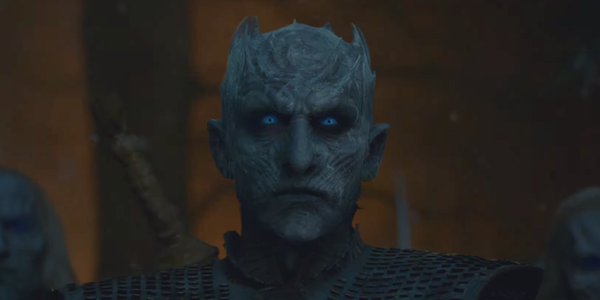How Game Of Thrones Handled The Night King In The Battle Of Winterfell

Spoilers ahead for Episode 3 of Game of Thrones Season 8.
The long-awaited showdown between the Night King and the living finally happened in Episode 3 of Game of Thrones Season 8, and it made for an extended battle sequence that was unprecedented on the small screen. Between the wights (including people, giants, and the little matter of Viserion), the White Walkers, the weather, and the Night King himself, the Night King seemingly had every advantage. So, did Game of Thrones allow him to win, kill the Three-Eyed Raven, and advance his dead army on the south?
Nope! The living prevailed, the Night King was defeated, and the implications for the rest of Season 8 are more than a little intriguing to consider. Let's jump into how it happened.
How The Night King Lost
For most of the episode, it really seemed like there was no way the Night King could lose. From the first clash of the battle that saw the thousands upon thousands of wights easily kill the horde of Dothraki screamers with their flaming arakhs (courtesy of Melisandre) to the wights swamping all the fortifications the living had painstakingly built to all the dead being resurrected courtesy of the Night King -- who had Viserion to do his bidding as well -- it seemed just a matter of time before he won and viewers had to start figuring out who the Night King left alive.
Well, the Night King's army may have been able to take down the living fighters en masse, and the war would have undoubtedly been lost to the dead if the results were decided solely on a battle in the field. Arya Stark was not in the field, however. Deadly as she is, Arya is an assassin used to working solo. After a terrifying sequence that nearly saw her death and cost Beric Dondarrion's life as he worked with the Hound to rescue her, Arya came face-to-face with Melisandre once more.
Fortunately, Arya hasn't been so dead-set on finishing her list that she immediately tried to kill to kill Melisandre, and the red priestess reminded her of their last conversation, when she prophesied that Arya would kill people with brown eyes, green eyes, and... blue eyes. Arya remembered what we say to the god of death -- "Not today," of course -- and ran off to do her solo thing. This involved arriving in the godswood in the nick of time to kill the Night King in a nifty knife move, saving Bran and all his knowledge as the Three-Eyed Raven.
It was too late for her to save Theon, but her actions ended the war in one fell swoop as all the wights and other White Walkers fell when the Night King did. Yes, Arya! So, that is how Game of Thrones handled the Night King at the Battle of Winterfell: by defeating him and all his fighters. Winterfell wasn't even 100% razed to the ground. That counts as a happy ending by Stark standards, right?
Your Daily Blend of Entertainment News
I've been a firm believer ever since I decided that the Battle of Winterfell had to happen in Episode 3 that the Night King had to lose, but once the episode hit the hour mark and there wasn't much in the way of hope for the living, I began to have serious doubts that the dead would be stopped. Maybe those fans who thought the Night King would visit King's Landing on Viserion weren't so wrong after all!
Thankfully, the dead did not emerge victorious. A happy ending by my standards! Here's what the Night King's loss means for the rest of Season 8.
What The Night King's Loss Means For Season 8
Well, the fall of the Night King and therefore the end of the entire threat of his undead army and the Long Night coming again means that the supernatural part of Game of Thrones may be done for good, and that means the rest of the series will likely be devoted to... well, the game of thrones.
The battle happening relatively early in the season suggests that the fight for the Iron Throne is going to be a lot more complicated than Dany just landing on the Red Keep with her dragons to intimidate Cersei into yielding the crown. It's possible that Dany is going to be a lot more cautious with her dragons after the Battle of Winterfell. Rhaegal certainly didn't escape unscathed, by the looks of his battle with undead Viserion, and Dany likely got a scare when Drogon rolled her off his back.
Cersei's forces already wounded Drogon when Bronn fired the scorpion at him back in Season 7; combine Dany's potential drive to protect the dragons with her stated desire to win the hearts of the Seven Kingdoms rather than just roasting them, and the battle for the Iron Throne could be as long and bloody in the field as the last half of the season permits.
Cersei does have 20,000 Golden Company soldiers, Dany's forces are now depleted after the Battle of Winterfell, and so the bloodbath might not be over. There are plenty of characters that did die in the Battle of Winterfell (although you can check the full list of major characters that died here), but even more big names who lived for the next stage of the game.
A bunch of people may be headed for the grave, and the end of the Night King at least means they'll probably stay there. With three episodes of the six-episode season presumably devoted to resolving the game of thrones, we can be reasonably confident that the show will do justice to the political fight for the Iron Throne that began way back in the first episode.
Hopefully it's interesting! For now, fans should enjoy what time is left before the next batch of deaths comes.
Be sure to tune in to HBO on Sundays at 9 p.m. ET for the final few episodes of Game of Thrones. The last three episodes should be nice and long, especially compared to the first two, so hopefully the show will go out with as much of a bang as possible. The finale will have to sustain us at least until the first spinoff and whenever George R.R. Martin finally gets around to finishing The Winds of Winter!

Laura turned a lifelong love of television into a valid reason to write and think about TV on a daily basis. She's not a doctor, lawyer, or detective, but watches a lot of them in primetime. CinemaBlend's resident expert and interviewer for One Chicago, the galaxy far, far away, and a variety of other primetime television. Will not time travel and can cite multiple TV shows to explain why. She does, however, want to believe that she can sneak references to The X-Files into daily conversation (and author bios).
